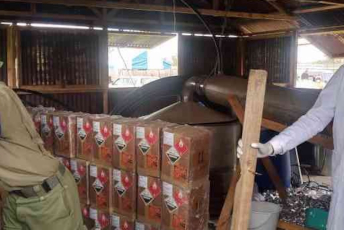Kenya’s Health Cabinet Secretary Mutahi Kagwe says criminals in his own ministry are running cartels that are smuggling blood to other countries in the region, such as Somalia. This illicit trade in blood donated by Kenyans is leading to an acute shortage in the country’s hospitals. ‘These cartels have been engaged in [the] blood trade within as well as outside the country,’ Kagwe announced earlier this year.
Kenya’s Directorate of Criminal Investigations (DCI Kenya) is investigating the allegations. However it’s questionable whether anyone found guilty will be brought to book. The country’s legislation on the management of donated blood is weak, and it has a poor record in successfully prosecuting corruption cases involving politically connected people.
DCI Kenya officials have been investigating the involvement of Kenya National Blood Transfusion Service (KNBTS) officials. KNBTS is a state institution under the health ministry that runs regional centres mandated to collect and distribute blood and related products and components to Kenyan hospitals.
This may have led to shady deals that saw the blood being sold to Somalia through Dadaab refugee camp, which is close to the Kenya-Somalia border. Somalia offers a preferred market due to weak governance structures that make smuggling easy. Periodic violent inter-clan clashes and terrorist attacks also increase the demand for blood needed for transfusions during medical treatment of casualties.
KNBTS statistics show that it collects about 150 000 to 200 000 units a year of the 500 000 to one million units the country needs annually. This is a lot short of the roughly 60 million to 70 million pints that could be collected if everyone who could – which is half the country’s 47.5 million people – donated one pint two to three times a year.
KNBTS officials blame the national blood shortage on the July 2019 withdrawal after 17 years of the annual US$8.5 million funding by the United States President’s Emergency Plan For AIDS Relief. These funds helped pay for personnel, equipment, storage etc. This blood shortage is made worse by smuggling.
Officers at DCI Kenya believe that blood is smuggled out of Kenya to Somalia, where its market value is the highest, and other countries in the East and Horn of Africa. Smugglers must be able to transport the blood between Kenya and Somalia in a way that keeps it viable. ‘This is a case of a smuggling network run by medical professionals who understand the trade,’ said a DCI Kenya officer who requested anonymity.
‘The chain of custody and the fact that moving blood and its components is not easy are proof of involvement of state professionals in smuggling,’ another officer, who also requested anonymity, told ENACT.
According to the officers, blood is smuggled out of KNBTS banks by medical professionals who then falsify the records while on their way to hospitals. Some hospitals also don’t declare unused blood initially intended for patients who end up not needing transfusions for various reasons, including death. This blood is diverted and smuggled alongside other medical supplies.
Two officials in two of the six KNBTS regional centres contacted by ENACT denied claims of smuggling operations in their centres. Speaking anonymously, one told ENACT that the blood collected by a KNBTS centre was never transported outside its area of jurisdiction.
‘If blood is needed, it is only authorised to move to other parts of the country when a disaster, such as a terror attack, has happened,’ he said. Another official pointed out that transporting blood and its components was difficult even under standard procedures.
Asked about the involvement of flying doctors – as the blood could be transported by air – DCI officers said they couldn’t disclose details of an ongoing investigation.
Initial leads in the investigations show the potential to unearth a multi-faceted illicit trade. ‘This includes links with the witchcraft-related network that smuggles organs of human victims with albinism, especially between Burundi and Tanzania,’ said an anonymous DCI Kenya officer.
If Kagwe’s allegations of blood smuggling are confirmed as correct, Kenya urgently needs to pass the bill currently before Parliament that seeks to guide and streamline blood donation and usage in the country, deterring the smuggling of blood and body parts. This includes making the KNBTS autonomous to streamline management.
Deo Gumba, ENACT Regional Organised Crime Observatory Coordinator – East and Horn of Africa and Mohamed Daghar, Researcher, ENACT project, ISS







